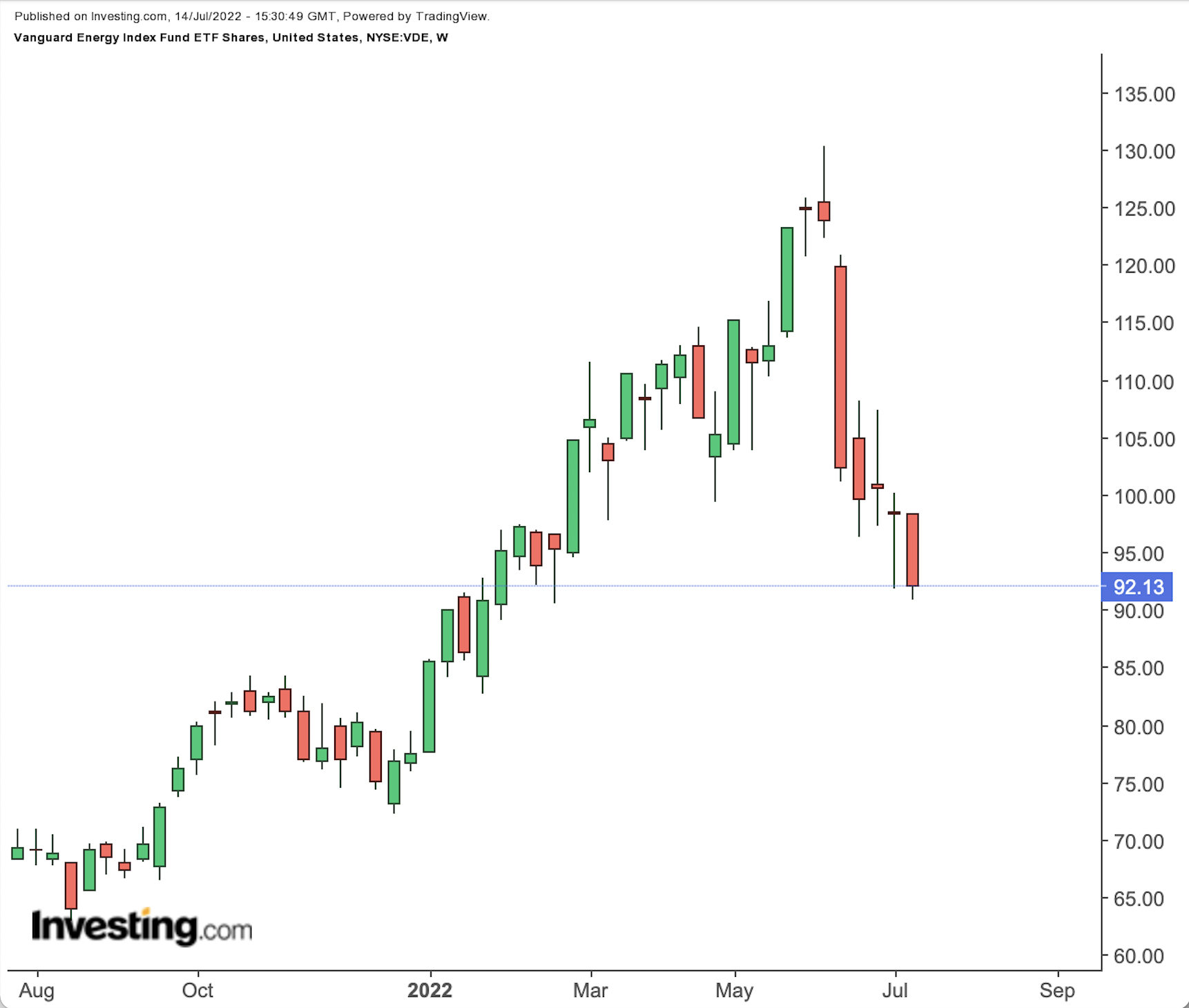- With the risk of recession growing, investors are dumping commodity producer stocks
- Vanguard Energy Index Fund ETF has shed more than 25% of value in last six weeks
- Commodity sector still offering best risk-reward prepositions in today’s bear market
Stocks linked to some of the world’s most consumed commodities are showing signs of peaking. With the risk of a recession growing, investors are dumping stocks of commodity producers which benefited massively during the past two years of supply shortages and soaring demand.
The Vanguard Energy Index Fund ETF Shares (NYSE:VDE)—whose top 10 holdings include Exxon Mobil (NYSE:XOM) and Chevron (NYSE:NYSE:CVX)— has shed more than a quarter of its value during the past six weeks. The ETF gained about 48.1% during the past year and closed Wednesday at $95.49.

Source: Investing.com
Similarly, the shares of the companies which produce fertilizers are in a downward spiral, dragged down in recent weeks by declining prices for corn, wheat and other crops. The shares of The Mosaic Company (NYSE:MOS) and CF Industries Holdings, Inc. (NYSE:CF) have lost 38% and 21%, respectively, during the past quarter after producing powerful rallies since the pandemic hit.
As fears of a looming recession overtake everything else, investors and analysts are trying to make up their minds, whether there is more steam left in the commodity supercycle that drove prices of energy, crops, and metals higher after Russia invaded Ukraine.
Demand for commodities is closely tied with the state of the economy. As the U.S. Federal Reserve aggressively pursues its monetary tightening, some economists now believe a recession is imminent in the next 12 months.
According to analysts at Goldman Sachs, the rally in commodities has more room to run and prices could surge in the second half of the year. In a recent note to clients, they said:
“We agree that when the economy is in a recession for long enough, commodity demand falls and, hence, prices fall. Yet, we are not at that state, with economic growth and end-user demand simply slowing, not falling outright.”
While Citigroup sees crude easing to the $80s by the fourth quarter on “strong headwinds to growth,” Goldman Sachs is among notable bulls, saying oil prices need more gains to normalize “unsustainably low” inventories.
Extremely Attractive
Amid these conflicting views on Wall Street about the future direction of commodities, the oil and gas sector is still offering the best risk-reward preposition in today’s bear market, especially when supply/demand remains tight after years of underinvestment and more recently due to rising cost of capital.
Due to these strengths, JPMorgan is recommending investors to buy top oil stocks after the recent slump. In a recent note the investment bank said:
“These supply and demand dynamics should continue to support elevated oil and gas prices, making the energy sector at current very low valuations extremely attractive.”
The firm said that energy, equipment, and services companies look especially attractive since the group should be “the largest beneficiary of increasing production as policy pivots towards energy independence from highly costly and restrictive ESG policies.”
As far as the fertilizer companies are concerned, there are still reasons to be bullish about their stocks. War in Europe is still raging, natural-gas prices are still sky-high in Europe, keeping pressure on fertilizer manufacturing costs and giving a leg up to companies that are less affected.
According to a report in Wall Street Journal:
“The number of acres planted for cash crops has been on the rise, indicating demand from farmers eager to grow as much as possible at lower but still profitable crop prices.”
Supplies of grains and fertilizer are low around the world and energy prices are high, which should keep food and fertilizer prices inflated through 2023, said Tracey Allen, commodity strategist at JPMorgan in the WSJ report.
Bottom Line
Commodity stocks seem to have passed their best days in the current boom. Their falling prices show that investors are now more concerned about the broader economy, which if slowed, could reduce demand in the second half of the year and beyond. That said, the world is still facing many challenges, from supply constraints to war in Europe, that could keep prices of commodities elevated, supporting the shares of companies that produce them.
Disclosure: Haris Anwar does not hold any positions in the assets mentioned in this article.
